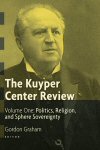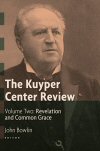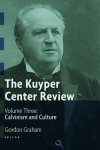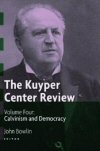Kuyper Center Review (4 vols.)
Digital Logos Edition
Get more books at a bigger discount when you order the Abraham Kuyper Comprehensive Studies Collection (28 vols.).
Overview
Each volume of The Kuyper Center Review, produced by the Abraham Kuyper Center for Public Theology at Princeton Theological Seminary, presents historical and critical essays exploring the relation between Reformed Christianity and culture. It focuses on the writings of Abraham Kuyper, whose life as a pastor, theologian, journalist, and politician remarkably exemplified expressions of confidence in the Christian worldview in both theory and practice. This annual publication offers readers the best new works exploring the history and contemporary relevance of Reformed theology for key topics in politics, economics, and culture.
Volume 1 explores Kuyper’s influential concept of sphere sovereignty as a way of delineating the boundaries of authority encompassing the various areas of life—private and public, ecclesial and secular. Volume 2 discusses the theological lens of common grace, which offers an accurate view of the relationship between Christianity and the broader culture. Volume 3 provides historical, theological, and practical treatments of the positive neo-Calvinist view of the arts and their place within Christianity. Volume 4 examines Kuyper’s contributions to the development of democracy in the Netherlands at the turn of the twentieth century, and suggests ways that Kuyper’s work can guide democracy today.

- The best new work on the history and relevance of Reformed theology for politics, economics, and culture
- Historical, theological, and practical essays on Kuyper and his enduring significance
- Articles on key topics produced by the Abraham Kuyper Center for Public Theology at Princeton
- Title: Kuyper Center Review
- Publisher: Eerdmans
- Volumes: 4
- Pages: 912
Individual Titles
- The Kuyper Center Review, vol. 1: Politics, Religion, and Sphere Sovereignty edited by Gordon Graham
- The Kuyper Center Review, vol. 2: Revelation and Common Grace edited by John Bowlin
- The Kuyper Center Review, vol. 3: Calvinism and Culture edited by Gordon Graham
- The Kuyper Center Review, vol. 4: Calvinism and Democracy edited by John Bowlin

Abraham Kuyper has long passed from the scene, but his influence still remains. Indeed, there is widespread and serious interest not only in Kuyper but also in Kuyperian themes among a new generation of thinkers.
The Abraham Kuyper Center for Public Theology at Princeton Theological Seminary was established in admiration of Kuyper, whose life as pastor, theologian, journalist, and politician remarkably exemplifies how confidence in the truth of a Christian conception of the world can be expressed in both theory and practice.
Many but not all of the chapters in this volume come from the Kuyper Conference of 2008, the theme of which was “Sphere Sovereignty and Civil Society.” Most of these essays thus have a broadly “political” character, some addressing contemporary issues, others of a more historical nature. Of special interest in this volume is a summary/translation of Kuyper’s 1907 essay “The Enigma of Islam,” never before published in English.
Contributors:
- John R. Bowlin
- James D. Bratt
- Jonathan Chaplin
- Michael J. DeMoor
- James J. S. Foster
- Gordon Graham
- George Harinck
- Oliver O’Donovan
- Rimmer de Vries
- John Halsey Wood Jr.
Gordon Graham is Henry Luce III Professor of Philosophy and the Arts at Princeton Theological Seminary and author of The Re-enchantment of the World: Art versus Religion and Philosophy of the Arts: An Introduction to Aesthetics.

Abraham Kuyper—pastor, theologian, journalist, and politician—is highly regarded as exemplifying how confidence in the truth of a Christian worldview can be expressed in both theory and practice. Honoring the spirit of Kuyper’s legacy, The Kuyper Center Review publishes substantial essays that relate the tradition of Reformed theology to issues of public life.
The chapters in this second volume in the series, Revelation and Common Grace, were originally presented at the annual Kuyper Conferences held at the Abraham Kuyper Center for Public Theology at Princeton Theological Seminary in 2009 and 2010. The 2009 conference celebrated the centenary of Herman Bavinck’s Stone Lectures, and it brought theologians and philosophers into conversation on topics that Bavinck considered relevant to assessing the nature and status of revelation. The 2010 conference explored the concept of common grace—key to the thought of both Kuyper and Bavinck—and especially its potential for furthering interreligious dialogue and understanding among the Abrahamic faith traditions.
Contributors:
- Leora Batnitzky
- Robert Covolo
- Emily Dumler-Winckler
- James Eglinton
- Anver M. Emon
- Gordon Graham
- George Harinck
- Andrew M. Harmon
- Jeffrey S. Hocking
- Cambria Janae Kaltwasser
- Brian G. Mattson
- Jon Stanley
- Henk van den Belt
- Dirk van Keulen
- Jan Veenhof
- Cory Willson
John Bowlin is Rimmer and Ruth de Vries Associate Professor of Reformed Theology and Public Life at Princeton Theological Seminary. He is author of Contingency and Fortune in Aquinas’ Ethics.

Some religious traditions—such as Lutheran, Wesleyan, and Eastern Orthodox—have aesthetically rich resources on which to draw for the renewal of arts in everyday life. In contrast, Calvinism has generally been suspicious of the arts.
The essays in this volume attempt to explore new avenues of thought about Calvinism’s relation to the arts. Part historical, part theological, and part practical, they offer a wide-ranging exploration of neo-Calvinism’s relationship to the arts, both at a general level and in connection with specific art forms. Overall they suggest that the neo-Calvinism espoused by Abraham Kuyper can and should make more of the arts than the traditional view of Reformed Christianity might be thought to allow.
Contributors:
- Clifford B. Anderson
- John Barber
- James D. Bratt
- Michael Bräutigam
- Janet Danielson
- Neal DeRoo
- John De Soto
- James Eglinton
- Matthew Kaemingk
- Jennifer Wang
- William Baltmanis Whitney
- Albert M. Wolters
Gordon Graham is Henry Luce III Professor of Philosophy and the Arts at Princeton Theological Seminary and author of The Re-enchantment of the World: Art versus Religion and Philosophy of the Arts: An Introduction to Aesthetics.

The Kuyper Center Review, vol. 4: Calvinism and Democracy
- Editor: John Bowlin
- Publisher: Eerdmans
- Publication Date: 2014
- Pages: 208
Kuyper was a principal force, both political and intellectual, behind the democratization of politics and public life that occurred in the Netherlands at the close of the nineteenth century. This volume reflects on that legacy, not only examining its theological roots and historical context but also assessing democracy’s prospects in our own day and considering the ways in which Reformed theology might provide resources for democratic criticism and renewal.
John Bowlin is Rimmer and Ruth de Vries Associate Professor of Reformed Theology and Public Life at Princeton Theological Seminary. He is author of Contingency and Fortune in Aquinas’s Ethics.
This title is included in the following collections
You can save when you purchase this product as part of a collection.
Abraham Kuyper Comprehensive S...
$599.99$599.99Logos 7 Reformed Diamond Legac...
$2,999.99$2,999.99Logos 7 Reformed Portfolio Leg...
$4,749.99$4,749.99Logos 8 Collector's Edition Le...
$11,399.99$11,399.99
- $11,399.99
- $21,749.99
- $37,403.33$27,999.99
Abraham Kuyper (1837–1920) was one of the most extraordinary individuals of his time. A prolific intellectual and theologian, he founded the Free University in Amsterdam and was instrumental in the development of Neo-Calvinism. He was also an active politician, serving as a member of Parliament in the Netherlands beginning in 1874 and serving as Prime Minister from 1901 to 1905.
At this intersection of church and state, he devoted much of his writing towards developing a public theology. His passion was to faithfully understand and engage culture through a Christian worldview. The most famous example is his articulation of the doctrine of common grace. His work has influenced countless others, including Francis Schaeffer, Cornelius Van Til, and Alvin Plantinga.